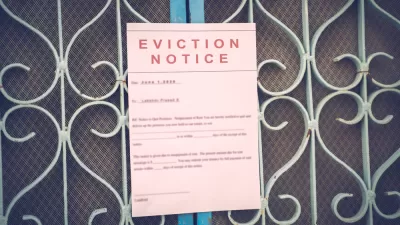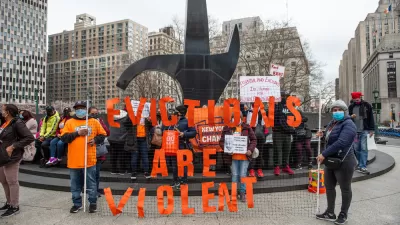The bill would have protected tenants from unfair evictions by requiring landlords to provide a reason for ending a lease.

A bill that would have strengthened protections for Connecticut renters failed to move forward in the state legislature again, reports Ginny Monk for the Connecticut Mirror.
House Bill 6889, which would have required landlords to provide a cause for eviction tenants, will not be put up for a vote. “The bill would have banned no-fault evictions, which typically occur at the end of a lease, in buildings with five or more units, after the tenant had been there for at least a year.”
Landlord groups opposed the bill on the grounds that it would make it too difficult to evict “problem” renters. “Speaker of the House Matt Ritter, D-Hartford, said he’d fielded concerns from lawmakers who feared that if new owners couldn’t evict renters, they wouldn’t be able to make renovations and rental housing would deteriorate.”
But tenant advocates say “this type of eviction may be used in retaliation when renters complain about housing conditions or to evict every resident of a building or complex when new ownership purchases the property.”
FULL STORY: No-fault evictions bill dies in CT legislature — again

Rethinking Redlining
For decades we have blamed 100-year-old maps for the patterns of spatial racial inequity that persist in American cities today. An esteemed researcher says: we’ve got it all wrong.

Planetizen Federal Action Tracker
A weekly monitor of how Trump’s orders and actions are impacting planners and planning in America.

Montreal Mall to Become 6,000 Housing Units
Place Versailles will be transformed into a mixed-use complex over the next 25 years.

Santa Clara County Dedicates Over $28M to Affordable Housing
The county is funding over 600 new affordable housing units via revenue from a 2016 bond measure.

Why a Failed ‘Smart City’ Is Still Relevant
A Google-backed proposal to turn an underused section of Toronto waterfront into a tech hub holds relevant lessons about privacy and data.

When Sears Pioneered Modular Housing
Kit homes sold in catalogs like Sears and Montgomery Ward made homeownership affordable for midcentury Americans.
Urban Design for Planners 1: Software Tools
This six-course series explores essential urban design concepts using open source software and equips planners with the tools they need to participate fully in the urban design process.
Planning for Universal Design
Learn the tools for implementing Universal Design in planning regulations.
City of Camden Redevelopment Agency
City of Astoria
Transportation Research & Education Center (TREC) at Portland State University
Regional Transportation Commission of Southern Nevada
Toledo-Lucas County Plan Commissions





























